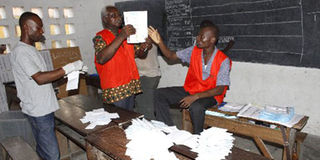Togo vote disputed as two camps claim win

Togolese electoral officials count ballots after the presidential election in the capital Lome. Togo's incumbent president and his main rival both claimed victory in an election ahead of results due on Saturday, setting the stage for protests. REUTERS
LOME, Saturday (Reuters) - Togo's incumbent president and his main rival both claimed victory in an election ahead of results due on Saturday, setting the stage for protests in the West African nation whose 2005 vote was marred by violence.
Thursday's poll was widely seen as a test for democracy in a region rife with coups and flawed elections and in a country in which hundreds of demonstrators died after the last presidential vote five years ago.
Parliamentary elections held in 2007 went off peacefully, leading to the restoration of foreign aid, but opponents to President Faure Gnassingbe have accused him of preparing to rig the vote this time around.
"On the basis of the counts from certain prefectures, the UFC candidate has won an average of 75 to 80 percent of the votes," said Jean-Pierre Fabre of the main UFC opposition party.
"We conclude that we have won the presidential election of March 4, 2010," he said.
A government spokesman rejected the claim as "a joke".
"The UFC is just trying to create trouble," Pascal Bodjona, who is also minister for territorial administration, told French RFI radio.
"From what we know of the returns, I think that the UFC has been completely routed," he said.
More than 3,000 local and nearly 500 European and West African observers monitored the election across Togo, a sliver of land between Ghana and Benin where half of the nation's 6.6 million people were registered to vote.
Election organisers say they expect to announce the vote result by late Saturday.
Gnassingbe's 2005 victory, allowed him to succeed his father's nearly four decades of dictatorship in the world's No. 4 producer of phosphate, a main ingredient for fertiliser.
But it touched off protests in which the military killed up to 500 people, triggering a refugee crisis in neighbouring Ghana and Benin.




